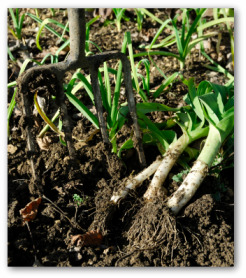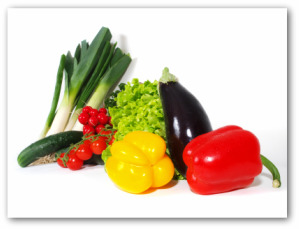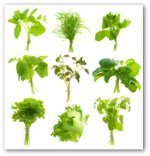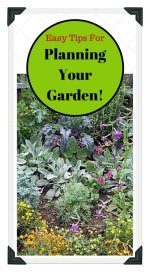How to Grow Leeks
and Harvest Them

Learn how to grow leeks in your home vegetable garden.
How to plant leeks in easy-to-follow steps for gardening success!
Design Your Own Vegetable Garden Layout Using our Free "Vegetable Garden Planner" Software!
This cold season type of vegetable is easily grown.
The ideal soil temperature for growing leeks is 75 degrees F but can withstand a minimum of 40 degrees F.
The annual leek plant is a member of the onion family.
Its white stem topped with deep-green foliage is valued as a mild flavoring to culinary dishes.
Growing leeks mature slowly but are well worth the wait, especially considering their expensive prices at produce markets!
Download Free Garden Planning Worksheets, Garden Diary, Zone Chart, Or Planting Guide
How to Grow Leeks by Direct Sowing
Plant leek seeds at a depth of ½ inch in early spring. Planting time is in late autumn for reverse season climates. Germination is typically 10 days to 2 weeks.
Ideal Soil for Growing Leeks

Have soil tested for adequate levels of nitrogen, phosphorous, and potassium.
Maintain a 6 -6.8 pH level by achieving a balance of equal parts of native soil, sand, compost, and well-rotted manure.
Prepare trenches 5 inches deep spaced 6-10 inches apart to receive transplants.
How to Plant Leeks in the Garden from Seedling Transplants
Sow leek seeds indoors 1/8 inch deep, 1 inch apart, in flats filled with loose enriched potting soil at least 3 inches deep.
Transplant into the garden when plants are three inches tall, spacing them 2-4 inches apart.
Caring for Leeks
Water growing leeks only when soil is dry to the touch.
If weather turns cold, cover garden bed with mulch to insulate the vegetable plants. To mulch, apply sand mulch to each stem just below the leaf junction. Add more as the crop grows until the trench is filled and forms a mounded row.
• Avoid applying sand mulch around crops higher than their leaf junctions to prevent sand lodging in the leek's leaves and stem.
Companion plants for Growing Leeks
• Companion plants for growing leeks are carrots, garlic, celery, and onions.
Vegetable Gardening Tip for Growing Leeks
Seedlings are tedious to thin and weed. Do not pull growing leeks up as unwanted grass!

How to Grow Leeks : Harvesting Leeks
Growing leeks are durable vegetables, which grow to maturity in 120-170 days.
Leek loses little of its flavor or texture waiting to be harvested.
Many annual bulb and tuberous vegetables such as leek, kale, shallot, and sweet potato tolerate long in-ground holding periods and will wait on you for a convenient harvesting time.
Produce can be gathered when stems reach 1-2 inches in diameter and the leaves reach 6-8 inches in height.
Harvest from maturity until the first hard frost.
• Vegetable gardening tip for growing leeks:
For longer harvests, leek plantings must be sequenced. Allow three weeks between planting. In colder temperature areas, cover the garden bed with straw mulch to hold soil temperatures through early winter.
Leeks offer Sweet and Delicate Taste

The mild flavor of leeks makes a perfect accompaniment to potatoes, yams, and other mild flavored tubers. Leeks are a primary ingredient in vichyssoise, a creamy cold summer soup. Leeks are the sweetest with the most delicate taste of all onions.
How to Grow Leeks : Storage of Harvested Leeks
Gather growing leeks as needed, as they do not store well out of the vegetable garden. Once harvested, they will keep for one to two weeks in the refrigerator when stored in a vegetable bag.
How to Grow Leeks : Varieties of Leek Plants
Growing leeks come in a wide variety including Arkansas, American Flag, King Richard, Laura, St. Victor, Splendid, Carina, Durabel, Giant Musselburgh, and Unique.
Preserving Leeks
Cleaned and chopped leeks may be packed in cup size portions or into ice cube trays and frozen. Each cube equals about 1 tablespoon.
Vegetable Gardening Tip
The secret to achieving excellent tasting frozen vegetables is to pick at the peak of ripeness. After picking, immediately immerse the produce in ice water prior to preparation for freezing. The ice water bath halts the ripening process, prevents sugars from converting to starch, preserves flavor, and stops spoilage.

